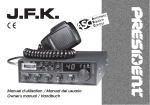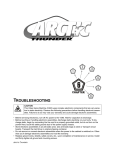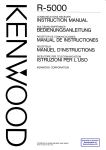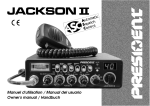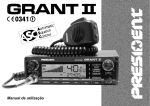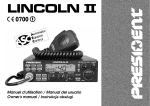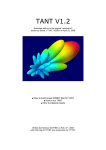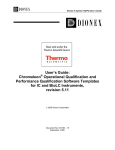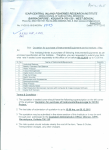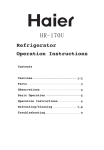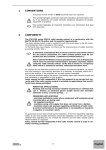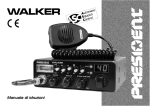Download President Lincoln II ASC manual
Transcript
Owner's manual Your PRESIDENT LINCOLN II ASC at a glance SUMMARY INSTALLATION HOW TO USE YOUR TRANSCEIVER MENU FUNCTIONS TECHNICAL CHARACTERISTICS TROUBLE SHOOTING GLOSSARY CERTIFICATE OF CONFORMITY GENERAL WARRANTY CONDITIONS English WARNING ! • The use of this equipment involves the possession of a Radio Amateur license • Before using, be careful never to transmit without first having connected the antenna (connection "B" situated on the back panel of English the equipment) or without having set the SWR (Standing Wave Ratio) ! Failure to do so may result in destruction of the power amplifier, which is not covered by the guarantee. The guarantee of this transceiver is valid only in the country of purchase. Welcome to the world of the new generation of transceiver radios. The new PRESIDENT range gives you access to top performance transceiver equipment. With the use of up-to-date technology, which guarantees unprecedented quality, your PRESIDENT LINCOLN II ASC is a new step in personal communication and is the surest choice for the most demanding of radioamateur users. To ensure that you make the most of all its capacities, we advise you to read carefully this manual before installing and using your PRESIDENT LINCOLN II ASC. A) INSTALLATION 1)WHERE AND HOW TO MOUNT YOUR TRANSCEIVER - N.B. : As the transceiver has a frontal microphone socket, it can be set into the dash board. In this case, you will need to add an external loud speaker to improve the sound quality of communications (connector EXT SP situated on the back panel: C). Ask your dealer for advice on mounting your transceiver radio. 2)ANTENNA INSTALLATION a)Choosing your antenna e)Do not forget to insert the rubber joints (3) between the transceiver and its support as these have a shock-absorbing effect which permits gentle orientation and tightening of the set. f) Choose where to place the microphone support and remember that the microphone cord must stretch to the driver without interfering with the controls of the vehicle. - For transceiver radios, the longer the antenna, the better its results. Your dealer will be able to help you with your choice of antenna. b)Mobile antenna - Must be fixed to the vehicle where there is a maximum of metallic surface (ground plane), away from windscreen mountings. - If you already have a radio-telephone antenna installed, the transceiver antenna should be higher than this. English a)You should choose the most appropriate setting from a simple and practical point of view. b)Your transceiver radio should not interfere with the driver or the passengers. c)Remember to provide for the passing and protection of different wires (e.g. power, antenna, accessory cabling) so that they do not in any way interfere with the driving of the vehicle. d)To install your equipment, use the cradle (1) and the self-tapping screws (2) provided (drilling diameter 3.2 mm). Take care not to damage the vehicle’s electrical system while drilling the dash board. - There are two types of antenna: pre-regulated which should be used on a good ground plane (e.g. car roof or lid of the boot), and adjustable which offer a much larger range and can be used on a smaller ground plane (see § HOW TO ADJUST SWR, below). - For an antenna which must be fixed by drilling, you will need a good contact between the antenna and the ground plane. To obtain this, you should lightly scratch the surface where the screw and tightening star are to be placed. - Be careful not to pinch or flatten the coaxial cable (as this runs the risk of break down and/or short-circuiting). - Connect the antenna (B). c)Fixed antenna - A fixed antenna should be installed in a clear a space as possible. If it is fixed to a mast, it will perhaps be necessary to stay it, according to the laws in force (you should seek professional advice). All PRESIDENT antennas and accessories are designed to give maximum efficiency to each transceiver radio within the range. b)Locate the positive and negative terminals of the battery (+ is red and - is black). Should it be necessary to lengthen the power cable, you should use the same or a superior type of cable. c)It is necessary to connect your transceiver to a permanent (+) and (-). We advise you to connect the power cable directly to the battery (as the connection of the transceiver cable to the wiring of the car-radio or other parts of the electrical circuit may, in some cases, increase the likelihood of interference). d)Connect the red wire (+) to the positive terminal of the battery and the black (-) wire to the negative terminal of the battery. e)Connect the power cable to your transceiver radio. WARNING: Never replace the original fuse (6 A) by one of a different value. 4)BASIC OPERATIONS TO BE CARRIED OUT BEFORE USING YOUR SET FOR THE FIRST TIME (without transmitting and without using the “push-to-talk” switch on the microphone) English OUTPUT RADIUS PATTERN 3)POWER CONNECTION Your PRESIDENT LINCOLN II ASC is protected against an inversion of polarities. However, before switching it on, you are advised to check all the connections. Your equipment must be supplied with a continued current of 12 volts (A). Today, most cars and lorries are negative earth. You can check this by making sure that the negative terminal of the battery is connected either to the engine block or to the chassis. If this is not the case, you should consult your dealer. WARNING: Lorries generally have two batteries and an electrical installation of 24 volts, in which case it will be necessary to insert a 24/12 volt converter (type CV 24/12 PRESIDENT) into the electrical circuit. The following connection steps should be carried out with the power cable disconnected from the set. a)Check that the battery is of 12 volts. a)Connect the microphone b)Check the antenna connections c)Turn the set on by turning the volume knob (1) clockwise. d)Turn the squelch SQUELCH knob (3) to minimum. e)Adjust the volume to a comfortable level. f) Go to channel 20 by using s/t keys (10). 5)HOW TO ADJUST SWR (Standing Wave Ratio) With the integrated SWR meter: Put the unit into AM or FM with the MODE key (18). Using PUSH knob (6), or s/t keys (10) position the unit in the middle of the band (you are advised to check the values obtained on the extreme frequencies, in all cases it is necessary to calibrate). Check that RF PWR knob (2) is at maximum. Press INDIC key (12) in TX mode until “SWR”appear in the display. If necessary, adjust your antenna to be close of 01.0. Warning: In order to ovoid any losses and attenuations in cables used for connection between the radio and its accessories, PRESIDENT recommends to use a cable with a length inferior to 3m. Your transceiver is now ready for use. 1)ON/OFF ~ VOLUME Turn on radio: clockwise turn VOLUME knob (1) until radio emit beep and show current channel, radio is on. Turn Off radio: counterclockwise turn VOLUME knob (1)until radio emit click sound ,then radio is off. Volume Adjustment: Radio is on, rotate VOLUME knob (1) to adjust volume. LCD shows “UOLXX” for 5 seconds which means volume level. Total is 36 levels. Clockwise to increase volume. Counterclockwise to decrease volume. 2)RF POWER In TX, rotate RF PWR knob (2) to adjust FM/AM/USB/LSB output power. Clockwise to increase power. Counterclockwise to decrease power. 3)ASC (Automatic Squelch Control) ~ SQUELCH Suppresses undesirable background noises when there is no communication. Squelch does not affect neither sound nor transmission power, but allows a considerable improvement in listening comfort. a)ASC: AUTOMATIC SQUELCH CONTROL Worldwide patent, a PRESIDENT exclusivity. Turn the SQUELCH knob (3) anti-clockwise into ASC position. “ASC” appears on the LCD. No repetitive manual adjustment and a permanent improvement between the sensitivity and the listening comfort when ASC is active. This function can be disconnected by turning the switch clockwise. In this case the squelch adjustment becomes manual again. “ASC” disappears from the LCD, “SQL on” appears for 5 seconds. b)MANUAL SQUELCH Turn the SQUELCH knob clockwise to the exact point where all background noise disappears. This adjustment should be done with precision as, if set to maximum (fully clockwise), only the strongest signals will be received. LCD shows “SQLXX” for 5 seconds which means squelch volume level. Total is 36 levels. 4)MENU Press the MENU key (4) for 2 seconds to enter in the menu function setting. “FUNC” appears on the LCD. Use s/t keys (10) to select the desired function. Use rotary PUSH knob (6) to set the function. Press any key except PUSH knob (6) or wait for 5 seconds to store and exit. “FUNC” disappears from the LCD. See § MENU FUNCTIONS for details, page 35. 5)MEM ~ STORE MEM (short press) Press MEM key (5) to enter into Memory Mode. Press s/t keys (10) on to select the pre-stored channel (6 memories). Press MEM key (5) again to exit Memory Mode. STORE (long press) Select desired channel, band and modulation mode. Long press MEM-STORE key (5) to enter into Channel Storage Setting, memory blinks in the LCD. Rotate PUSH knob (6) to select the storage memory n1 ~ n6. Long press MEM-STORE key (5) until blinking memory disappeared. Storage finished and exit Channel Storage Setting. 6)ROTARY “PUSH” KNOB In POWER ON status, rotate PUSH knob (6) to adjust frequency. Clockwise to increase, counterclockwise to decrease. Press PUSH knob (6), “-”displayed under frequency which means adjust frequency’s stepping. Push or rotate the PUSH knob (6) is also used to set functions or parameters. 7)CLARIFIER This CLARIFIER knob (7), allows a frequency deviation during reception in order to improve the clearness of your correspondent’s voice. 8)MIC GAIN In POWER ON status, rotate MIC GAIN knob (8) to adjust microphone gain. LCD shows “nIC XX” for 5 seconds which means microphone gain level. Total is 36 levels Clockwise to increase, counterclockwise to decrease. In PA status, rotate MIC GAIN knob (8) to adjust volume. LCD shows “nIC XX” for 5 seconds which means microphone volume level. Total is 36 levels. Clockwise to increase, counterclockwise to decrease. 9)RF GAIN In RX, rotate RF GAIN knob (9) to adjust RX gain. Clockwise to increase, counterclockwise to decrease. English B) HOW TO USE YOUR TRANSCEIVER 10) s/t CHANNEL/FREQUENCY SELECTOR AM AM mode selected s/t keys (10) allows increasing or decreasing a channel number or a frequency number according the choose done in the [UP dn] menu (see § s/t KEYS SETTING, page 36). A “Beep” sounds each time the channel/frequency changes if the BEEP function is activated (see KEY BEEP function page 33). FM FM mode selected USB USB mode selected In MENU status, the s/t keys allows to select menu. LSB LSB mode selected CW CW mode selected PA PA (Public Address) mode selected Shows the channel number 11) LCD Shows the current Band Shows DCS code or CTCSS tone Shows the frequency and menu values 12) INDIC ~ CALL INDIC (short press) Indicates transmission Indicates that front panel keys are locked except PTT pedal and knobs. LCD shows “Err” when locked key is pressed Beep function activated on TX, bargraph shows Standing Wave Ratio (SWR) and value (see INDIC function following) English ROGER ROGER BEEP function is activated ECHO ECHO function is activated DW DUAL WATCH activated 10K Frequency +10K function is activated NB NB filter activated ANL HI-CUT EMG ANL filter activated HI-CUT filter activated The emergency channel 9 or 19 activated SCANSCAN function activated Automatic Squelch Control activated VOX VOX function activated MEM Memorised frequency is selected DCS DCS code is used CTCSS CTCSS tone is used Press INDIC key (12) to display current voltage, shows as “13.8DC”in LCD. Press INDIC key (12) again or wait for 5 seconds to disable voltage display. In TX, press INDIC key (12) to select the feature to be displayed. LCD alternates with: FREQUENCY ~ SWR ~ TOT ~ VOLTAGE. Every time the PTT pedal is pressed, LCD shows frequency and selected feature. CALL (long press) Press INDIC-CALL key (12) every time to send pre-editing prompt voice code calling. LCD shows “TX”. (see § CALL FREQUENCY, page ). 13) ECHO ~ ECHO SET ECHO (short press) Press ECHO key (13) to enable/disable ECHO function. LCD shows “ECHO”. ECHO SET (long press) Press ECHO-ECHO SET key (13) to set ECHO VOLUME level and ECHO TIME. “ECHO” blinks on the LCD. Press s/t keys (10) on the unit or on the microphone (24) to select alternately “ ” or “ ” on the menu list. Ratate PUSH knob (6) to set the selected feature. There are 32 DELAY levels, default: 10. There are 32 “TIME”, default: 1. LCD shows selected “ ” level or selected “ ”. Press MEM-STORE (5) key for 2 seconds to store and skip into next menu. Wait for 5 seconds to exit ECHO SET. CH9/19 (short press) Press CH19/9 key (14) to enter Emergency Channel. LCD shows “EMG”. First time to select channel 19, second time for channel 9, third time to go back to current channel. LOCK (long press) Long press CH19/9-LOCK key (14) to enable key LOCK function. LCD shows “ ”. Long press CH19/9-LOCK key (14) again to disable key LOCK function. “ ” disappears from LCD. Note: When active, front panel keys are locked except PTT pedal and rotaty knobs (PUSH knob (6) is locked). LCD shows “Err” when locked key is pressed. 15) NB/ANL ~ HI-CUT NB/ANL (short press) 3 positions switch: Off • NB (NB filter activated) • NB/ANL (both filters activated). When active, the filter is displayed on the LCD. NB: Noise Blanker / ANL: Automatic Noise Limiter. These filters allow reducing back ground noises and some reception interferences. HI-CUT (long press) HI-CUT: Cuts out the high frequency interferences and has to be used in accordance with the reception conditions. When active “HI-CUT” is displayed on the LCD. 16) ROGER ~ BEEP ROGER BEEP (short press) Press ROGER key (16) to enable/disable the ROGER BEEP function. “ROGER” appears on the LCD when the function is active. The Roger Beep sounds when the PTT pedal (23) of the microphone is released in order to let your correspondent speak. Historically as transceiver is a “simplex” communication mode, it is not possible to speak and to listen at the same time (as it is the case with a telephone). Once someone had finished talking, he said “Roger” in order to prevent his correspondent that it was his turn to talk. The word “Roger” has been replaced by a significant beep. There comes “Roger beep” from. KEY BEEP (long press) Press ROGER-BEEP key (16) for 2 seconds to enable/disable the KEY BEEP function. A beep sounds when key is pressed, changing the channel etc. “ ” appears on the display when the function is active. 17) SCAN ~ DW SCAN (short press) Press SCAN key (17) to enable SCAN function. LCD shows “SCAN”. The scanning stops as soon as there is a busy channel. In SCANNING, press s/t to change scan direction. Press SCAN key (17) again or PTT pedal (23) to exit scan. DUAL WATCH (long press) This function allows to survey between channel set on in the [ ] menu (see page 36) and the current channel. Long press SCAN-DW key (17) to enable DW function. LCD shows “DW”. Long press SCAN-DW key (17) again or PTT pedal (23) to exit DW function. 18) MODE ~ CTCSS/DCS MODE (short press) Press MODE key (18) to select the modulation mode: AM ~ FM ~ USB ~ LSB ~ CW or PA. Corresponding mode is displayed on the LCD. Your modulation mode has to correspond to the one of your correspondent. - Frequency Modulation / FM: for nearby communications on a flat open field. - Amplitude Modulation / AM: communication on a field with relief and obstacles at middle distance (the most used). - Upper and Lower Side Band / USB-LSB: used for long distance communications (according to the propagation conditions). - CW is used with morse key on the CW KEY jack on the back panel (F). - An external loud speaker can be connected to your LINCOLN II by the PA jack plug situated on the back panel PA.SP (D). The message transmitted into the microphone will be directed towards the external speaker and be amplified. See § MIC GAIN page 31 for adjustment of volume. CTCSS/DCS (long press) This function is only enabled in FM modulation Long press MODE-CTCSS/DCS key (18) to enable CTCSS tone or DCS code. “CTCSS” or “DCS” blinks on the LCD. English 14) CH9/19 ~ LOCK Rotate PUSH knob (6) to set desired CTCSS tone. There are 38 CTCSS tones from 01 to 38. Continue to rotate PUSH knob (6) to set desired DCS code. There are 104 DCS codes from 001 to 104. Select “oFF” for disable the CTCSS tone or DCS code. Press MEM/STORE (5) for 2 seconds to store the CTCSS tone or DCS code. Long press MODE-CTCSS/DCS key (18) to disable CTCSS tone or DCS code. See tables on page 52 19) VOX ~ VOX SET VOX (short press) The VOX function allows transmitting by speaking into the original microphone (or in the optional vox microphone) without pressing the PTT pedal (23). In case of the use of an optional vox mike connected to the rear panel of the radio - VOX MIC jack (E), the original microphone doesn’t work. Press the VOX key (19) in order to activate the VOX function. “VOX” is displayed on the LCD. A new pressure on the VOX key (19) switches the function off. “VOX”disappears from the LCD. VOX SET (long press) 20) SPLIT ~ SPLIT SET SPLIT (short press) The SPLIT function allows to transmit and receive on separated frequencies. Press SPLIT key (20) to enable repeater function, LCD shows “ ” for 5 seconds. Press SPLIT key again to disable repeater function, LCD shows “ ” for 5 seconds. Note: Channel, Band and Frequency are blinking if the SPLIT function is active. SPLIT SET (long press) Long press SPLIT-SPLIT SET key (20) to set repeater’s OFFSET and DIRECTION Press s/t (10) to alternate between FREQUENCY OFFSET and DIRECTION in the menu list. Rotate PUSH (6) knob to set desired feature. Press MEM/STORE key (5) for 2 seconds to store and skip into next menu. Press SPLIT key (20) or wait for 5 seconds to exit SPLIT SET function. - FREQUENCY OFFSET: frequency blinks on the LCD. - DIRECTION: LCD shows “SPLiT”.“ ” in LCD means positive offset set in current channel, “ ” means negative offset set in current channel. English Press for 2 second the VOX-VOX SET key (19) in order to activate the VOX SET function (if the VOX function is off, this will turn the function on and display “VOX” on the LCD). “ ” appears on the LCD. Three features are possible: Sensitivity level, Anti-Vox level and Vox Delay time. Press s/t keys (10) in order to select to the following feature. LCD shows the feature. Rotate PUSH (6) to set the feature. Press MEM/STORE key (5) to store and skip into the next feature. Once the adjustments are done, press the VOX-VOX SET key (19) in order to quit the VOX SET function. If any adjustment have been done during 5 seconds, the transceiver will quit the VOX SET function automatically. 21) BAND ~ +10KHz ”: allows the adjustment of the microphone (original one -Sensitivity “ or optional vox) for an optimum transmission quality. Adjustable level from 1 (high sensibility) to 9 (low sensibility). Default: 5. -Anti-Vox “ ”: allows disabling the transmission generated by the surrounding noise. The level is adjustable: 0 (OFF), from1 (high level) to 9 (low level). Default: 9. - Delay Time “ ”: allows avoiding the sudden cut of the transmission by adding a delay at the end of speaking. The level is adjustable from 1 (short time delay) to 9 (long time delay). Default:1. 22) 6 PIN MICROPHONE PLUG BAND (short press) Press BAND key (21) for quick movement skipping 200 kHz in A ~ B ~ C ~ D ~ E ~ F ~ 9 ~ H ~ I segments. +10KHz (long press) Long press BAND-+10KHz key (21) to enable frequency +10KHZ. LCD shows “10K ” Long press BAND-+10KHz key (21) again to disable frequency +10KHZ. “10K” disappears from the LCD. The plug is located on the front panel of the transceiver and makes the setting of the equipment into the dashboard easier. See Cabling Diagram page 52. Transmission key, press to transmit a message, “TX” is displayed and release to listen to an incoming communication. A) DC-POWER TERMINAL (13,2 V) B) ANTENNA CONNECTOR (SO-239) C) EXTERNAL SPEAKER JACK (8 Ω, Ø 3,5 mm) D) JACK FOR OPTIONAL PA (Public Address) (Ø 3.5 mm) E) JACK FOR OPTIONAL VOX MIKE (Ø 2.5 mm) F) JACK FOR CW DEVICE (Ø 3.5 mm) G) USB DATA C) MENU FUNCTIONS Press the MENU key (4) for 2 seconds to enter in the menu function setting. “FUNC” appears on the LCD. Use s/t keys (10) to select the desired function. Use rotary PUSH knob (6) to set the function. Press any key except PUSH knob (6) or wait for 5 seconds to store and exit. “FUNC” disappears from the LCD. 1)ROGER BEEP FREQUENCY Set the FREQUENCY of the ROGER BEEP. At [ ] menu, rotate PUSH knob (6) to set the Frequency. Frequency range: 300 Hz ~ 3000 Hz, stepping frequency:10 Hz, default:1050 Hz. Press PUSH knob (6) to change the step. 2)ROGER BEEP TIME Set the TIME (ms) of the ROGER BEEP. At [ ] menu, rotate PUSH knob (6) to set the delay Time. Time range 50 ~ 1000 ms, time stepping: 50 ms, default: 500 ms. Press PUSH knob (6) to change the step. 3)CW FREQUENCY Set the FREQUENCY of the CW. At [ ] menu, rotate PUSH knob (6) to set the Frequency. Frequency range: 300 Hz ~ 3000 Hz, stepping frequency:10 Hz, default:1050 Hz. Press PUSH knob (6) to change the step. 4)CALL FREQUENCY Set the FREQUENCY of the CALL tone. At [ ] menu, rotate PUSH knob (6) to set the Frequency. Frequency range: 300 Hz ~ 3000 Hz, stepping frequency:10 Hz, default:1050 Hz. Press PUSH knob (6) to change the stepping. 5)MONITOR GAIN VOLUME Set the OUTPUT VOLUME LEVEL of the microphone in your own speaker. At [ ] menu, rotate PUSH knob (6) to set the Monitor volume level. There are 32 levels. “OFF” disable the function. 6)TOT (Time Out Timer) Set the TOT. If the PTT pedal (23) is pressed for more than “TOT” time, the transmission ends. At [ ] menu, rotate PUSH knob (6) to set the TOT, “ ” disable the function. Time range 30 ~ 600 s, time stepping: 30 s, default: 180 s. 7)SWR PROTECTION Enable/disable the SWR PROTECTION. At [ ] menu, rotate PUSH knob (6) to enable “ protection. Default: “ ”. ” or disable “ ” the 8)SWR PROTECTION SETTING Set the SWR LEVEL PROTECTION. At [ ] menu, rotate PUSH knob (6) to set the protection Level. Level range: 12 ~ 200 , stepping:1, default: 200. Press PUSH knob (6) to change the step. The SWR level is useful only in the SWR protection function is active. 9)VOLTAGE PROTECTION Enable/disable VOLTAGE PROTECTION. ] menu, rotate PUSH knob (6) to enable “ At [ the protection. Default: “ ”. ” or disable “ ” 10) VOLTAGE PROTECTION HIGH Set the HIGHER LIMIT of VOLTAGE PROTECTION. At [ ] menu, rotate PUSH knob (6) to set the High limit. Voltage range: 90U ~ 170U V, stepping: 01U, default: 170U. Press PUSH knob (6) to change the step. The HIGH limit is useful only if the VOLTAGE protection function is active. English 23) PTT 11) VOLTAGE PROTECTION LOW 17) RESET Set the LOWER LIMIT of VOLTAGE PROTECTION. At [ ] menu, rotate PUSH knob (6) to set the Low limit. Voltage range: 90U ~ 170U V, stepping: 01U, default: 90U. Press PUSH knob (6) to change the step. The LOW limit is useful only if the VOLTAGE protection function is active. Initialization of the unit. At [ ] menu, select “ ” for all functions setting initialised, select “ ” for all functions and channels setting initialized. Short press PUSH knob (6) to confirm. Wait until LCD shows “ ”. D) TECHNICAL CHARACTERISTICS 12) SCAN TYPE Select the TYPE of SCAN. At [ ] menu, rotate PUSH knob (6) to select the Type. “ ”means scanning stops when busy channel is founded. “ ” means scanning stops when busy channel is founded and return to scan after 5 seconds. 13) BACKLIGHT COLOR Select the BACKLIGHT COLOR of the unit. At [ ] menu, rotate PUSH knob (6) to select the Color. Three colors are possible “ ” (orange/default), “ ” (green) or “ 1)GENERAL - Modulation modes - Frequency ranges - Antenna impedance - Power supply - Dimensions (in mm) - Weight - Accessories supplied ” (blue). 14) BACKLIGHT BRIGHTNESS Adjust the BACKLIGHT BRIGHTNESS of the unit. At [ ] menu, rotate PUSH knob (6) to select the BRIGHTNESS. Brightness level: 1 ~ 9, default: 9. English 15) s/t KEYS SETTING Select the UP/DOWN KEY feature. At [ ] menu, rotate PUSH knob (6) to select the Feature. “ ” means s/t keys changes CHANNEL (default). “ ” means s/t keys changes FREQUENCY. Note: If FREQUENCY is selected. Press PUSH knob (6) to select the frequency digit to be increased by the s/t keys. 16) DW SETTING Set the CHANNEL use with DUAL WATCH function. At [ ] menu, press BAND key (21) to select desired band, press MODE key (18) to select desired modulation mode, rotate PUSH knob (6) to select channel. Default: band: I - modulation: FM - channel: 09. See DUAL WATCH function, page 33. : AM / FM / USB / LSB / CW : from 28.000 MHz to 29.700 MHz : 50 ohms : 13.2 V : 170 (W) x 250 (D) x 52 (H) : 1,4 kg : microphone UP/DOWN with support, mounting cradle, screws and fused power cord. 2)TRANSMISSION - Frequency allowance - Carrier power : +/- 300 Hz : 12 W AM / 28 W FM / 31 W USB-LSB (PEP) / 12 W CW - Transmission interference : inferior to - 50 dBc : 300 Hz to 3 KHz in AM/FM/USB/LSB - Audio response - Emitted power in the adj. channel : inferior to 20 µW - Microphone sensitivity : 3.0 mV - Drain : 6 A (with modulation) - Modulated signal distortion : 2 % 3)RECEPTION - Maxi. sensitivity at 20 dB sinad - Frequency response - Adjacent channel selectivity - Maximum audio power - Squelch sensitivity - Frequency image rejection rate - Intermediate frequency rej. rate - Drain : 0.7 µV - 110 dBm (AM) 0.35 µV - 116 dBm (FM) 0.28 µV - 118 dBm (USB/LSB/CW) : 300 Hz to 3 kHz in AM/FM/LSB/USB : 60 dB : 3 W : minimum 0.2 µV - 120 dBm maximum 1 mV - 47 dBm : 60 dB : 70 dB : 400 mA nominal / 600 mA maximum E) TROUBLE SHOOTING 1)YOUR transceiver RADIO WILL NOT TRANSMIT OR YOUR TRANSMISSION IS OF POOR QUALITY - Check that the antenna is correctly connected and that the SWR is properly adjusted. - Check that the microphone is properly plugged in. 2)YOUR transceiver RADIO WILL NOT RECEIVE OR RECEPTION IS POOR - Check that the squelch level is properly adjusted. - Check that the volume is set to a comfortable listening level. - Check that the antenna is correctly connected and that the SWR is properly adjusted. - Check that you are using the same modulation mode as your correspondent. 3)YOUR transceiver WILL NOT LIGHT UP INTERNATIONAL PHONETIC ALPHABET OOscar PPapa QQuebec RRomeo S Sierra TTango UUniform Brand : PRESIDENT Model : LINCOLN II VVictor WWhiskey XX-ray YYankee ZZulu EN 301 783 - 1 EN 301 783 - 2 EN301 489 - 15 EN 60950 - 1 (2006) + A11 (2009) and is in conformity with Directive RoHS2: 2011/65/EU (2011/06/08). Balaruc, the 2013/12/16 Jean-Gilbert MULLER General Manager English F) GLOSSARY HHotel IIndia JJuliett K Kilo L Lima MMike NNovember We, GROUPE PRESIDENT ELECTRONICS, Route de Sète, BP 100 – 34540 Balaruc – FRANCE, Declare, on our own responsibility that the transceiver radiocommunication transceiver is in conformity with the essential requirements of the Directive 1999/5/CE (Article 3) adapted to the national law, as well as with the following European Standards: - Check the power supply. - Check the connection wiring. - Check the fuse. AAlpha BBravo CCharlie DDelta EEcho FFoxtrott GGolf CERTIFICATE OF CONFORMITY GENERAL WARRANTY CONDITIONS This device is guaranteed 2 years parts and labour in its country of purchase against any manufacturing defects validated by our technical department. *The After-sales Service of PRESIDENT reserves the right not to apply the warranty if a breakdown is caused by an antenna other than those distributed by PRESIDENT, and if said antenna is at the origin of the breakdown. An extension of 3 years warranty is proposed systematically for the purchase and use of a PRESIDENT antenna, bringing the total duration of the warranty to 5 years. In order to be valid, the warranty certificate must be returned within a period of 30 days after the purchase date to the After-sales Service of the company Groupe President Electronics, or any foreign subsidiary. It is recommended to carefully read the following conditions and to respect them under penalty of losing their benefit. * In case the device is not under warranty, the repair and return of the device will be charged. * All related documents must be preserved even after the end of the warranty period and if you resell your device, given to the new owner for the After-sales follow-up. * In case of real malfunction, please contact your dealer first; they will decide action to be taken. * In case of an intervention not covered by the warranty, an estimate will be established before any repair. Thank you for your trust in the PRESIDENT quality and experience. We recommend that you read this manual carefully so that you are completely satisfied with your purchase. Do not forget to return the detachable warranty certificate on the right hand side of this page; it is very important for the identification of your device during a possible rendering of our services. * To be valid the warranty certificate must be returned to us at the latest 1 month after the purchase. Technical Manager and Quality Manager * Please duly complete the warranty certificate on the right hand side of the page, detach it (portion to be removed marked by dotted line) and send it back. * Any repair under warranty will be free and the return delivery costs will be borne by our company. * A purchase proof must be necessarily included with the device to be repaired. * The dates listed on the warranty certificate and proof of purchase must match. * Do not proceed with the installation of the device without reading the user manual. # * No spare part will be sent nor exchanged by our services under warranty. Date of purchase : ........................................................................................ The warranty is only valid in the country of purchase. Type : Radio Amateur LINCOLN II English Exclusions (are not covered): * Damages caused by accident, shock or inadequate packaging. Serial N°:....................................................................................................... * Power transistors, microphones, lights, fuses and the non respect of the installation and use of specifications (including but not limited to antenna used with too high power, final output power transistors (SWR), inversion of polarities, bad connections, overvoltage,….) * The warranty cannot be extended due to the non-availability of the device while it is being serviced at our technical services location, nor by a change of one or more components or spare parts. * Transceivers which have been modified. The warranty application is excluded in case of modification or poor maintenance done by a third party not approved by our company. If you note malfunctions: * Check the power supply of your device and the quality of the fuse. * Check that the antenna, the microphone…. are correctly connected. * Check that the squelch level is properly adjusted; the programmed configuration is the correct one... NOT COVERED BY THE WARRANTY WITHOUT THE DEALER STAMP 1409/12-13 SIEGE SOCIAL/HEAD OFFICE - FRANCE Route de Sète - BP 100 - 34540 BALARUC Site Internet : http://www.president-electronics.com E-mail : [email protected]

















